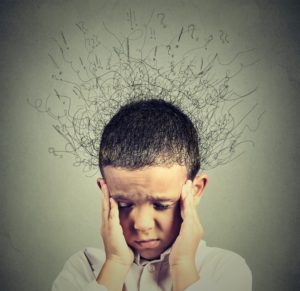Doctors’ Notes
BackAnxiety & Self-Care
Anxiety is common in children and teens. Fortunately, anxiety is, at its core, an emotion like any other.
 With a few tips and tricks, dedicated practice, and help from those around us, we can all reduce and manage the anxiety we feel. I hope some of the tips and tricks below can help in stressful times!
With a few tips and tricks, dedicated practice, and help from those around us, we can all reduce and manage the anxiety we feel. I hope some of the tips and tricks below can help in stressful times!
Consistency and Checking In
It’s really important to maintain a schedule. Consistency is key.
There can be lots of flexibility, but this is a good time to reinforce good habits. Ensuring that you and your child/teen are sleeping well, eating well, and getting some daily physical activity is invaluable. Your own behavior is a form of communication with your child/teen, so modeling calmness and consistency, and maintaining as much normalcy as possible, send a message of reassurance.
I suggest, if possible, including an emotional check-in as part of your routine. It’s important to listen actively, to acknowledge and validate your child’s thoughts, emotions, and reactions. Showing that you’re interested in their feelings will make it easier for them to approach you; validating will make it easier for them to share and process their feelings.
Your child might best express their feelings through drawing, dancing, singing, or talking, so encouraging these forms of communication can be really helpful. Remember that strong feelings and emotions are just that — and that they come and go!
Checking in with other family members and friends is also a good idea. Being physically isolated doesn’t mean we have to be socially isolated too. You might be providing a helping hand or listening ear to someone in need, and you may also find that this act of reaching out and connecting, of having that empathetic outward focus, lifts you up too!
Mind-Body Connection
In the office, I often talk about the mind-body connection and the importance of mindfulness. Mindfulness is the practice of changing your relationship with your thoughts: acting and thinking in the present, with the intentional choice of bringing your attention to the here and now. It’s a non-judgemental practice of being in the moment, which can help reduce the fear that comes from facing an unknown future. Recognizing when your brain is busy and how to re-focus is an important skill.
For more about Mindfulness from Kids Plus, see Terri Bailey’s wonderful Doctor’s Note.
For one of my favorite videos on the topic, check out What is Mindfulness?
There are many really helpful apps that focus on mindfulness. Some of my favorites include:
Headspace
Headspace for Kids
Calm
In addition to mindfulness practice, some other things you can start trying right at home to help your child/teen feel calmer include deep breathing, imagery/visualization, and muscle relaxation. I’ll briefly walk through these…
Deep Breathing
Encourage your child to inhale slowly over 2-5 seconds through their nose, hold for 2-5 seconds, then exhale slowly through their mouth over 2-5 seconds. When you’re done, that is one deep breath! (This is called “triangle breathing.”) Try doing this five times in a row! It can help reset the mood!
Your child can also trace the outline of their right or left hand with a finger from the opposite hand. As they inhale, trace upwards on a finger, hold their breath at the top of the finger, and exhale as they trace down the other side of the finger! Then continue with the rest of your hand for a total of five breaths.
Two of my favorite deep breathing videos — especially for kids, but useful for all ages — are:
Belly Breathing with Elmo
Take 5 Breathing
You can also review deep breathing here
Abdominal Breathing
Deep Breathing
Imagery / Visualization
Another good exercise to help reset when feeling overwhelmed. For a few minutes, close your eyes and take your mind to one of your favorite places — a place where you feel calm and relaxed. It can be the beach, the mountains, an ice cream shop, or even your bedroom! Picture this favorite spot, and use all of your senses. What do you see? What do you hear? What do you smell? What do you feel? What do you taste? Focus on the details.
Here’s one of my favorite videos, which walks you through this exercise as well: Guided Imagery
Progression Muscle Relaxation
Muscle tension can be the body’s physical response to anxiety and stress. So changing your physical state and relaxing your muscles can decrease anxiety and stress.
Progressive muscle relaxation involves learning to monitor tension in specific muscles by first intentionally tensing and then releasing, focusing on the differences felt between these two actions. Intentional stretching for 3-5 minutes, changing your physical state, can also have a big impact.
Here’s one of my favorite videos discussing guided muscle relaxation: Guided Relaxation for Kids
It’s important to practice these exercises, mastering them when we don’t feel overwhelmed, so that when we are feeling overwhelmed, we can use them. Without practice, these skills may not be strong enough to help us when we really need them.
Self-Care
In addition to working on schedules and mindfulness, it’s also a great time to invest in yourself.
There are lots of ways to practice self-care. Self-care can look like writing a gratitude list, spending time outside, going for a walk, listening to music, having a dance party, baking, coloring, taking a bath, doing something creative, starting a new hobby, etc.
Incorporating physical activity into your daily routine can also be very valuable. The benefits of physical activity actually have a neurochemical basis; exercise reduces the body’s levels of stress hormones while increasing the body’s production of endorphins. A “runner’s high” is a real thing!
For all the negative that has come with our current situation, one thing that we do have is more time. This creates an opportunity for us to try new activities, set new goals, or simply be together with our families.
* For the adults in the room, it’s not uncommon to have an alcoholic beverage. Now that our teens and college students are home, it’s important for parents to model healthy consumption of alcohol. Alcohol is not an effective coping strategy and can lead to addiction. Parents should model moderation and monitor teens and young adults for alcohol consumption.
What to Do When Anxiety Arises
 Even with all these coping strategies, anxiety is an emotion we will all experience at some time or another. It’s an integral part of the human experience. So I encourage my patients to practice sitting with anxiety.
Even with all these coping strategies, anxiety is an emotion we will all experience at some time or another. It’s an integral part of the human experience. So I encourage my patients to practice sitting with anxiety.
This will be hard at first. But with practice, you will gain a better understanding of your anxiety, discovering that it is a wave that you can ride, and that these feelings will pass. Verbalizing the experience of anxiety, rather than avoiding it, allows one to process these emotions and ultimately leads to less anxiety over time.
I also encourage practicing the skill of tolerating uncertainty. Inability to tolerate uncertainty can lead to increased anxiety. We’ve all experienced the uneasiness that comes with, say, not knowing the answer to a question. You can build this skill during your daily routine by pausing, going for a walk, or listening to a song, for example, before looking up something or texting someone else to find the answer.
Speaking of Texting…
For our teenagers and young adults, it’s an especially important time to figure out how they can best express their independence. As discussed above, it’s best to first acknowledge and validate their situation and emotions. But then I encourage you to plan together, create choices, and figure out how they can express their freedom and autonomy in the household. Allowing teens to create their own schedules will give an outlet for their autonomy.
It’s important for parents to have realistic expectations of their child/teen during this time. If, for example, your child was never asked to take out the trash before this incident but is now assigned this duty without discussion, that might cause conflict. It’s ok to encourage competence by having your child/teen take on more responsibility in chores and household tasks, but I would encourage you to let them choose the task, as this can provide more motivation to follow through.
Some Parting Thoughts
I encourage you to be gentle with and compassionate to yourself and to your family. Please always allow room for mistakes, forgiveness, and humility. There are going to be tough moments, but there will be good moments too.
If you feel your child is feeling overwhelmed and having symptoms that interfere with their daily activities like school, work, relationships, etc., please reach out to us at Kids Plus. We’re always here for your children, and to help with their well-being.
Please stay healthy, happy, and safe.
Dr. Kate Belser is a former Kids Plus Provider.